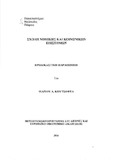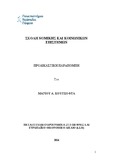| dc.contributor.advisor | Athanasopoulos, Constantinos GE. | |
| dc.contributor.author | Κουτσόφτας, Μάριος Α. | |
| dc.date.accessioned | 2017-01-03T09:19:25Z | |
| dc.date.available | 2017-01-03T09:19:25Z | |
| dc.date.issued | 2016 | |
| dc.identifier.uri | http://hdl.handle.net/11728/9210 | |
| dc.description | Summary
Under Article 267 TFEU a national court of a Member - State has the
privilege for preliminary reference to the ECJ. Thus, that Court has to be
authoritarian enough when delivers preliminary rulings, since its judgments
are binding to all the EU Members. Moreover, a right for preliminary reference
can also be made by a commission for which again the ECJ's ruling has to be
applied uniformly across the EU Members.
According to Article 267 TFEU par.1 a national court could ask the ECJ on
matters of force or on the interpretation of the subsidiary EU law. Within the
subsidiary law are included the interpretation of Directives, the power and the
interpretation of the acts of the EU institutions and organizations. However,
national courts are not permitted to ask questions on matters of interpretation
of their national laws. Therefore, questions of uniformity between the EU law
and national law or constitutional compatibility are not allowed. Consequently,
according to the above, a national judge has to ask a question to the ECJ in a
general manner; for example a question should be on whether such a
measure which corresponds to that national law is generally in compliance
with the EU law. If a Member State unilaterally in the process of interpreting
the EU law gives it a broader interpretation than it should, then again the ECJ
should make a ruling on the matter of the interpretation, bearing in mind that
the uniformity of the EU law among the Member States should be achieved.
Moreover, if a question is expressed wrongly then the ECJ has the power to
change it, ex officio, in order to fit its purposes of uniformity.
Additionally, Art. 267 TFEU par. 2 states that the question the national Court
imposes on the ECJ must be one of decisive importance. The ECJ in the
process of examining the aforementioned pre-request it examines whether it
is a subjective question or not; namely whether the national Court tries
through the procedure of a preliminary ruling to get a legal opinion.
Furthermore, it examines the connection between the enforcement of the EU
law and the preliminary ruling, thus making the preliminary reference
insignificant and purely of theoretical interest. Therefore, national Courts must
explain and clarify the reasons behind a question and thus strengthening the
need of having a ruling from the ECJ to an important matter. However, a decision of a national Court on a subject matter that was referred to the ECJ
makes the question to the ECJ obsolete.
Furthermore, examining Art. 267 TFEU par.2 it becomes clear that national
Courts have the right rather than the obligation to make preliminary
references to the ECJ. On the other hand, Art.267 TFEU par.3 establishes an
obligation on the national Courts to make a reference to the ECJ on matters
that their national judgments cannot be challenged by other internal national
remedies. According to the prevailing opinion which is in line with the scope of
a unified interpretation of the EU law, it is accepted that if a national Court is
of a low rank or not should be taken into account so as to decide whether an
additional remedy should be allowed. So, if in one case the national Court
gives a final judgment without allowing a further challenge, it should be
accepted that a preliminary question should be forwarded to the ECJ,
irrespective of the fact that for other cases its judgments could be challenged
with other internal remedies.
Nevertheless, a national Court of a low ranking is released from such an
obligation to forward a question to the ECJ if the ECJ has previously given a
ruling to a similar question (acte eclaire). In cases where there is settled
jurisprudence by the ECJ or when the application of the EU law does not give
an ambiguous interpretation, then again the national Court is not obliged to
forward a question to the ECJ. However, this last exception should be
approached strictly. Finally, if the national Court wants to depart from the
interpretation of the EU law then again it should ask for a preliminary ruling by
the ECJ. | en_UK |
| dc.description.abstract | Κατά το άρθρο 267 ΣΛΕΕ δικαίωμα για προδικαστική παραπομπή έχει ένα
Δικαστήριο κάποιου κράτους μέλους. Οι αποφάσεις αυτού του Δικαστηρίου
πρέπει να περιβάλλονται το κύρος της νομολογιακής απόφασης και είναι
δεσμευτικές. ·Ετσι δικαίωμα για προδικαστική παραπομπή έχει και μια
επιτροπή για την οποία ισχύουν τα ανωτέρω.
Σύμφωνα με το αρθρ. 267 παρ. 1 ΣΛΕΕ μπορούν να τεθούν ερωτήματα που
αφορούν την ισχύ ή την ερμηνεία του δευτερογενούς Ενωσιακού Δικαίου. Σ'
αυτά περιλαμβάνεται η ερμηνεία των Συνθηκών, η ισχύς ή ερμηνεία των
πράξεων των οργάνων της Ένωσης, των διάφορων οργανισμών και θεσμών,
της Ένωσης.
Δεν επιτρέπεται να τεθούν ερωτήματα σχετικά με την ισχύ του εσωτερικού
δικαίου. Ούτε ερωτήματα που αφορούν την συμβατότητα του ενωσιακού με το
εσωτερικό δίκαιο ή ερωτήματα συνταγματικής συμβατότητας. Έτσι σύμφωνα
με τα ανωτέρω ο εθνικός δικαστής πρέπει να θέσει το ερώτημα γενικά όπως
π.χ αν ένα τέτοιο μέτρο που αντιστοιχεί στον τάδε νόμο θα ήταν γενικά
συμβατό με το ενωσιακό δίκαιο. Αν ένα κράτος μέλος μονομερώς στην
προσπάθεια του να ερμηνεύσει το ενωσιακό δίκαιο το ερμηνεύσει ευρύτερα
απ' ότι του αναλογεί , τότε και πάλι το Δικαστήριο θα αποφασίσει σχετικά
αφού το ενδιαφέρον του για ενιαία ερμηνεία του Ενωσιακού Δικαίου
παραμένεΙ. Αν το ερώτημα διατυπωθεί λάθος τότε το Δικαστήριο θα μεταβάλει
το ερώτημα αυτεπάγγελτα.
Κατ ' αρθρ. 267 παρ . 2 ΣΛΕΕ πρέπει η τεθείσα ερώτηση του ερωτώντος
δικαστηρίου κατά την άποψη του ίδιου Δικαστηρίου να είναι αποφασιστικής
σημασίας. Το Δικαστήριο εξετάζει αυτή την προϋπόθεση κοιτάζοντας αν είναι
μόνο υποθετικής φύσεως ερωτήματα (π.χ προσπάθεια επίτευξης μιας
γνωμοδότησης) . Εξετάζει περαιτέρω αν μεταξύ της εξέτασης ισχύος του
Ενωσιακού Δικαίου και της συγκεκριμένης απόφασης δεν υπάρχει καμία
σύνδεση , καθιστώντας το ερώτημα έτσι άνευ σημασίας και καθαρά
θεωρητικού ενδιαφέροντος. Έτσι τα εθνικά Δικαστήρια πρέπει να
διατυπώνουν τους λόγους για τους οποίους το ερώτημα είναι σημαντικό.
Η διαδικασία καθίσταται άνευ αντικειμένου αν η διαδικασία ενώπιον του
εθνικού Δικαστηρίου έχει πλέον περατωθεί.
Εξετάζοντας το άρθρο 267 παρ.2 ΣΛΕΕ διαπιστώνει κανείς ότι τα εθνικά
δικαστήρια έχουν δικαίωμα για υποβολή ερωτήματος. Αντιθέτως το αρθρ. 267
παρ. 3 ΣΛΕΕ ιδρύει μια υποχρέωση για τα εθνικά Δικαστήρια, οι αποφάσεις
των οποίων δεν μπορούν πλέον να προσβληθούν με ένδικα μέσα του εθνικού
δικαίου. Κατά την επικρατούσα άποψη που υπηρετεί καλύτερα τους σκοπούς
ενιαίας ερμηνείας του ενωσιακού δικαίου και ενιαίας εφαρμογής του, γίνεται
αποδεκτό ότι το αν ένα εθνικό Δικαστήριο είναι τελευταίου βαθμού
δικαιοδοσίας ή όχι πρέπει να λαμβάνεται υπόψη με βάση την συγκεκριμένη
υπόθεση. Έτσι αν σε μια περίπτωση ένα Δικαστήριο θα αποφασίσει σε τελικό
βαθμό χωρίς να μπορούν οι αποφάσεις του να προσβληθούν με περαιτέρω
ένδικα μέσα θα πρέπει να γίνει δεκτό ότι είναι υποχρεωμένο να θέσει το
ερώτημα, έστω και αν σε άλλη περίπτωση οι αποφάσεις του προσβάλλονται
με ένδικα μέσα.
Το εθνικό Δικαστήριο τελευταίου βαθμού απελευθερώνεται από μια τέτοια
υποχρέωση όταν το Δικαστήριο έχει ήδη σε όμοιο ερώτημα απαντήσει (acte
eclaire). Όταν υπάρχει πάγια νομολογία του Δικαστηρίου ή όταν η εφαρμογή
του ενωσιακού δικαίου δεν αφήνει λογικές αμφιβολίες για την ερμηνεία του
ενωσιακού δικαίου (acte clair). Αυτή η τελευταία εξαίρεση πρέπει να
προσεγγίζεται με αυστηρότητα. Απαγόρευση στην τελευταία αυτή περίπτωση
δεν υπάρχεΙ. Αν θέλει το εθνικό Δικαστήριο να παρεκκλίνει από την ερμηνεία
του ενωσιακού Δικαίου πρέπει να στείλει πάλι σχετικό ερώτημα. | en_UK |
| dc.language.iso | el_GR | en_UK |
| dc.publisher | Πρόγραμμα Διεθνές και Ευρωπαϊκό Οικονομικό Δίκαιο, Σχολή Νομικών και Κοινωνικών Επιστημών, Πανεπιστήμιο Νεάπολις Πάφου | en_UK |
| dc.rights | Απαγορεύεται η δημοσίευση ή αναπαραγωγή, ηλεκτρονική ή άλλη χωρίς τη γραπτή συγκατάθεση του δημιουργού και κάτοχου των πνευματικών δικαιωμάτων | en_UK |
| dc.subject | Research Subject Categories::LAW/JURISPRUDENCE | en_UK |
| dc.subject | δίκαιο | en_UK |
| dc.subject | άρθρο 267 ΣΛΕΕ | en_UK |
| dc.subject | Ερμηνεία Δευτερογενούς Ενωσιακού Δικαίου | en_UK |
| dc.subject | Αποφάσεις Δικαστηρίων | en_UK |
| dc.subject | Εθνικά Δικαστήρια | en_UK |
| dc.subject | Ενωσιακό Δίκαιο | en_UK |
| dc.title | Προδικαστική παραπομπή | en_UK |
| dc.type | Thesis | en_UK |


